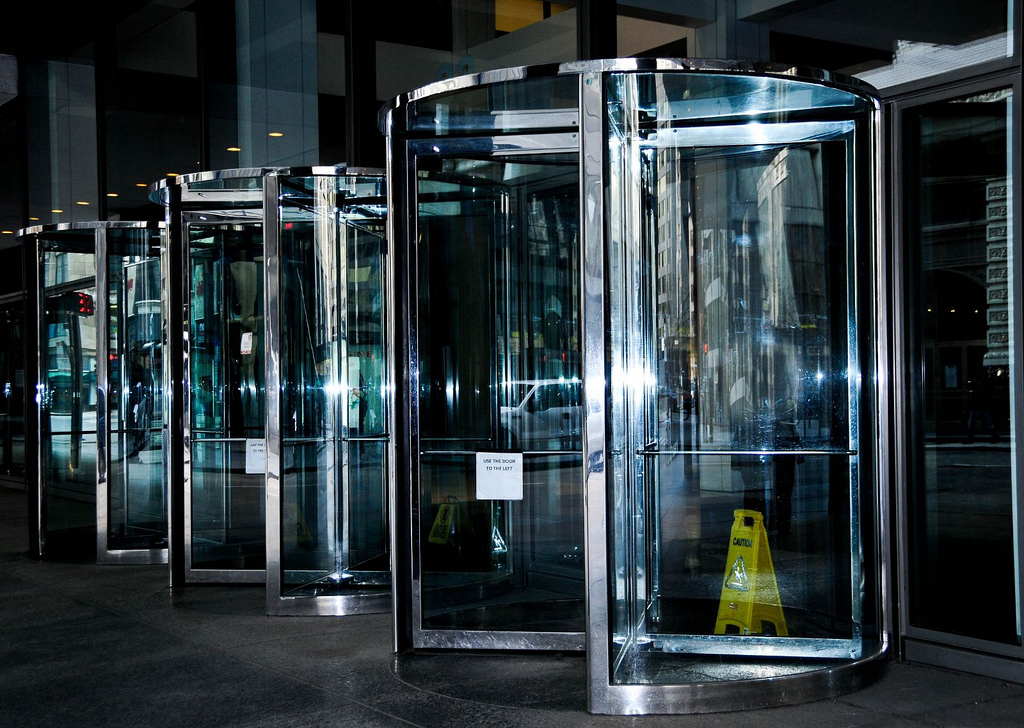A prestigious New York City literary agent’s close encounter with revolving doors — and resulting lawsuit — is drawing attention to the doors’ inherent dangers.
Marianne Strong, a 91-year-old literary agent, was on her way out of a gala held at the Jumeirah Essex House in Manhattan in May of this year when the incident occurred. “The door swiveled — and then I came out on the sidewalk,” she explained to the New York Post. “I was on the pavement, and out cold.”
Strong, who is seeking unspecified damages, suffered a broken hip and said that the doors “were moving very rapidly, too fast.” She also believes that the hotel should have appointed an attendant at the exit, saying, “In many places, they have people pushing the doors open, to look out for the people. That’s common sense — so that people don’t fall and sue the hotel.”
As unusual as Strong’s experience may seem, there have been comparable revolving door accidents. Former San Francisco 49er player Vincent Rovetti fell and broke his hip after being struck by an automatic revolving door at a San Francisco Marriott in 1997 — Rovetti later died after suffering a heart attack during surgery. And, in 2004, a six-year-old was killed by an automatic revolving door at Mori Tower in the Roppongi Hills complex in Japan, while a South African girl, whose head was caught between a wall and a revolving door, survived.
In March of this year, Edinburgh College’s revolving doors came under scrutiny when students declined to use them because they felt unsafe. One student at the college endured broken bones when her face and arm were caught in the manually revolving door. According to James Moohan, students’ association vice-president, the doors are especially dangerous during high-traffic periods. “The risks of that door are endless,” he explained. “The students do not feel safe using it.” At the time, the school’s staff was debating replacing the doors or modifying them to reduce speeds. (As reported by the Post, in the U.S., such doors should “require about 60 to 80 pounds of pressure and they should move no faster than 15 revolutions per minute. By way of comparison, a car engine operates within a range of 2,000-3,000 rpm.”)
These revelers could stand to be reminded of some of the dangers of revolving doors. From Scott Beale.
Michael Panish, an automatic door expert witness, has evaluated revolving door injuries and has identified certain factors associated with those injuries: for example, injuries may be more likely to occur when users are distracted. “Today’s culture of constantly using phones and wireless communication devices has created a dangerous shift of attention,” writes Panish, “from being aware of your surroundings to being distracted and oblivious of your immediate environmental location.”
Pedestrians can prevent revolving-door injuries by avoiding the doors altogether, or bearing a few key points in mind:
- Avoid distractions such as cell phones before entering, and while using, revolving doors.
- Use common sense. Revolving doors aren’t always properly maintained or operated — if the revolving door does not appear safe, use a different exit or entrance.
- Note whether the revolving door seems to be moving dangerously fast — especially during heightened traffic hours, such as during rush hour.
- Use revolving doors monitored by attendants when possible.
- Be cautious when using a revolving door while walking with children, strollers, pets, or luggage and other packages.
